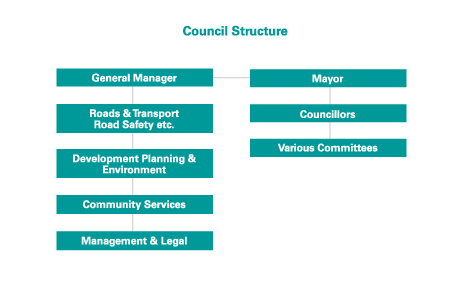How Councils operate
The role, structure and processes of local government.
Councils operate within a legislative framework established by the NSW Parliament. The Local Government Act 1993 sets out the major powers, functions and responsibilities of councils. There are a number of other laws for which councils are also responsible including the provision, maintenance and management of roads under the Roads Act 1993.
Local Councils follow the same basic structure as the State and Federal governments, but on a much smaller scale. There are two lines of authority - the political line with the elected councillors led by the Mayor, and the administrative line of employed staff under the General Manager.

Councillors
Councillors are elected to represent the interests of the local community. They are required to:
- represent the interests of the residents and ratepayers
- provide leadership and guidance to the community
- facilitate communication between the council and the community
- promote the overall interests of the council to the other spheres of government and other relevant bodies.
The Mayor is the political leader of the Council and is elected by the Councillors. Councillors are responsible for determining Council policy on a wide range of issues, such as economic development, infrastructure and the provision of community services. Councillors work with the administrative staff through various committees of Council including the Traffic Committee.
Your first point of contact should be the relevant manager from the administrative staff. This is the most direct and effective way of getting something done, if your request is within existing guidelines for action.
If you are unhappy with the response, then it is worthwhile making contact with the councillors on relevant committees to seek their support for your request or to explain a problem. Councillors do make themselves available to discuss community issues with residents. In some councils this will be at set appointment times, others provide email and after-hours contact numbers.
If the councillor you have talked to is not helpful, it is OK to contact another one. In many cases it will be wise to lobby as many councilors as you can.
AdministrationThe General Manager is the administrative head of the Council and is responsible for the implementation of policies that have been approved by the Councillors. Each Council has a Management Plan which sets out what they will do over the next few years. Administrative staff cannot make independent decisions on issues raised by the community. They have to work within the Management Plan and policies set by Council.
For example: Your council is considering an application for a major commercial development with a shopping centre and office buildings. You contact Council suggesting that motorcycle specific parking and secure storage facilities should be included in the new building.
The Councils Development Planning staff will consider your suggestion when they review the Development Application to see whether it complies with the conditions of the Council Development Control Plan (DCP). If motorcycle facilities are not included in the DCP, then the Planners cannot introduce them as a condition of approval even if they think it would be a good idea.
Your only hope would be to lobby the Councillors and the developer to persuade them of the political benefits of such facilities.
As a result of years of lobbying by pedal cyclists, many councils do now include provision for bicycle parking facilities in their DCPs for commercial developments. There are rarely similar provisions for motorcycles, but this could change with lobbying. How to lobby your Council

